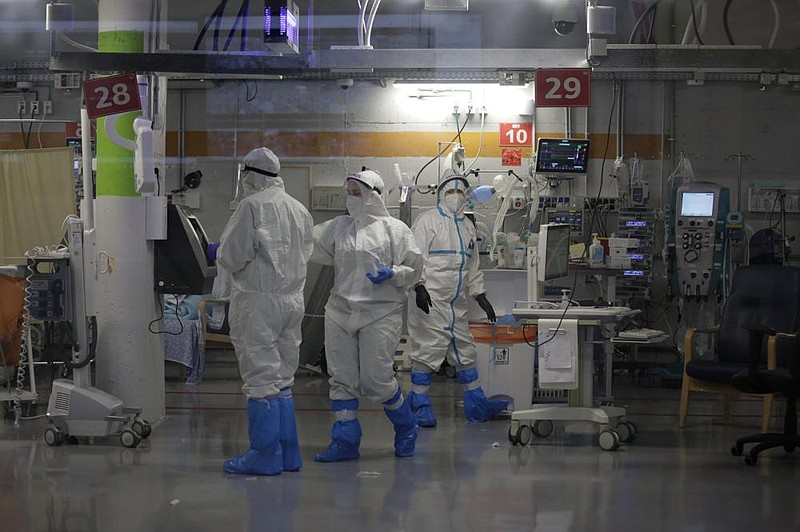Israeli law curbs rallies during pandemic
JERUSALEM -- Israel's parliament passed a law Wednesday that would allow the government to curtail public protests during the country's nationwide coronavirus lockdown, a measure that drew fierce opposition a day earlier.
The law allows the government to declare a special weeklong state of emergency if the coronavirus spreads out of control. If such a state is declared, the government would be able to limit participation in assemblies, including protests, to just about a half-mile from a person's home, effectively putting a halt to large weekly demonstrations outside Prime Minister Benjamin Netanyahu's residence.
The Knesset approved the bill 46-38 during a late-night session that stretched into the morning hours.
That measure is seen by some as a bid to squelch protests against Netanyahu.
[CORONAVIRUS: Click here for our complete coverage » arkansasonline.com/coronavirus]
Netanyahu has said the protests must end in the interest of public health.
Netanyahu is on trial on charges of fraud, breach of trust and accepting bribes in three cases. He has denied any wrongdoing, accusing the media and law enforcement agencies of an orchestrated "witch hunt" against him.
Last month, Israel declared its second countrywide lockdown.
Macron urges more flexibility on Russia
PARIS -- French President Emmanuel Macron urged Europe to seek a dialogue with Russia to enhance the continent's security rather than relying primarily on the NATO military alliance.
Speaking Wednesday in a news conference in Riga, the capital of the Baltic nation of Latvia, Macron said Europeans should be able to rethink their relation with Russia despite recent tensions after the poisoning of Russian opposition figure Alexei Navalny.
During a three-day visit to Lithuania and Latvia, Macron sought to reassure that his goal was to build up Europe's defense capabilities as a complement to NATO -- not to replace it.
Macron's efforts toward Russia have prompted concerns from Baltic states, whose relations with Russia have remained icy for nearly 30 years since their independence in the wake of the 1991 collapse of the Soviet Union. Estonia and Latvia both have sizable ethnic-Russian minorities, while Lithuania's ethnic-Russian population is more minor.
Ruling holds Japan liable in '11 disaster
TOKYO -- A high court Wednesday in Japan became the first at that level to hold the government responsible for the 2011 Fukushima nuclear disaster, saying in a ruling that the state and the plant's operator must pay about $9.5 million in damages to survivors.
The overpowering earthquake and tsunami that ripped through northern Japan in March 2011 caused a triple meltdown at the Fukushima Daiichi plant, leading to the worst nuclear crisis since Chernobyl.
Under Wednesday's ruling by the Sendai High Court, the government and Tokyo Electric Power Co. must compensate 3,550 plaintiffs, the Kyodo news agency reported. The plaintiffs had sought monthly compensation payments of about $475 per person until radiation at their homes returns to pre-crisis levels.
In 2017, a lower court had ordered the government and the utility to pay about half that amount to about 2,900 plaintiffs. But the ruling by Sendai's high court, one of eight such courts in Japan, is significant because it could set a legal precedent for dozens of similar lawsuits that have been filed across the country.
The deadline for filing an appeal is Oct. 14. The utility said in a statement Wednesday that it would examine the judgment before responding to it.
Half brother takes over as Kuwait's ruler
DUBAI, United Arab Emirates -- Kuwait's Sheikh Nawaf Al Ahmad Al Sabah was sworn in before parliament Wednesday as the ruling emir of the tiny oil-rich country, propelled to power by the death of his half brother after a long career in the security services.
At age 83, Sheikh Nawaf is not expected to deviate from the diplomatic path charted by his predecessor, the late Sheikh Sabah Al Ahmad Al Sabah. But his accession touched off speculation about who will become the next crown prince in the country known for its lively elected parliament and relative independence in the neighborhood of Gulf Arab monarchies.
The late Sheikh Sabah, 91, made his final journey to Kuwait later on Wednesday, his remains flying back to Kuwait City from Rochester, Minn., home of the flagship campus of the Mayo Clinic where he had been receiving treatment after surgery.
State television broadcast live as the ruler's body, draped in a Kuwaiti flag, arrived at the airport. A host of Kuwaiti officials and close relatives carried the body aloft into an ambulance.
Although his funeral would ordinarily draw tens of thousands of Kuwaiti mourners and scores of foreign dignitaries, because of the coronavirus pandemic the burial was restricted to relatives, reported Kuwait's state-run news agency, KUNA.

